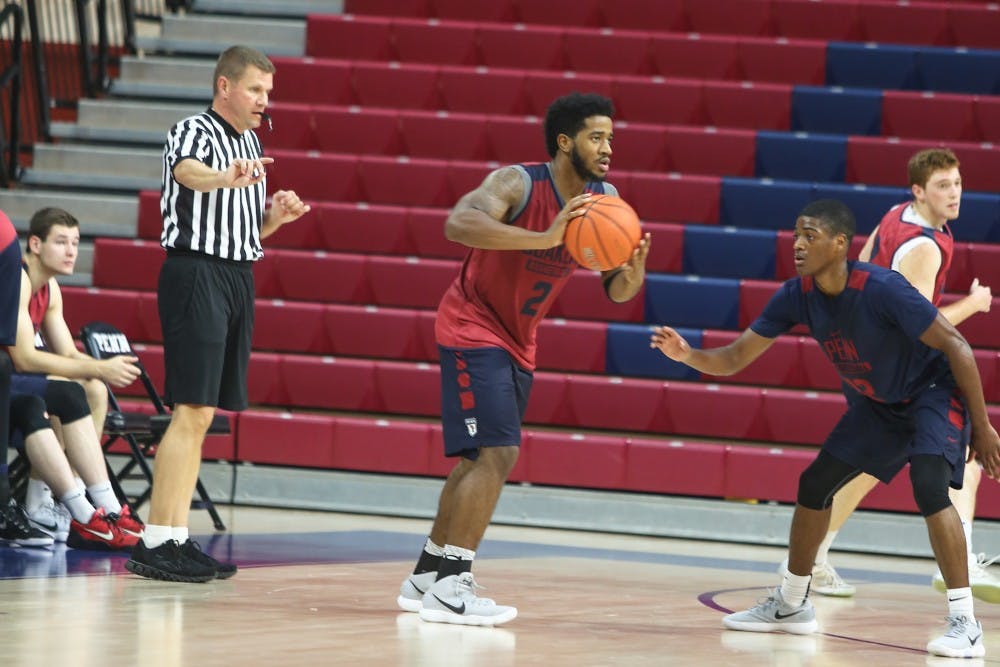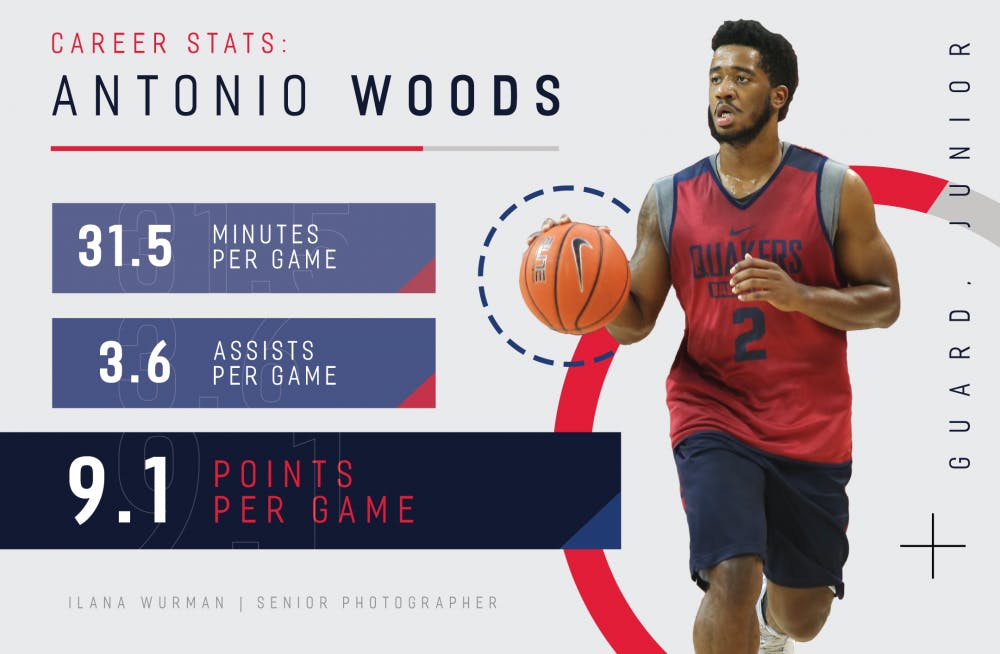
Penn men's basketball will certainly benefit from the experienced hand of junior guard Antonio Woods, who returns after a year of academic ineligibility.
Credit: Ilana WurmanPenn men's basketball guard Antonio Woods is ready for his second act.
After facing a temporary academic suspension that kept him off the court from January of 2016 until the conclusion of this past season, Woods has been back at Penn taking classes since last spring and is now ready — and academically eligible — to help the Quakers return to the Ivy League Tournament.
Before his suspension, Woods was widely seen as one of the program’s brightest stars. Starting as a freshman, he contributed 8.4 points per game and led the team in assists and minutes played. His sophomore season was cut short by the suspension, but Woods made the most of his limited opportunities as his scoring average rose to 10.7 points per game.
Woods' suspension took a steep toll on the team; after his sudden departure, the Quakers struggled to finish the 2015-2016 season, losing their final four Ivy games. Those struggles extended into the beginning of last season as Penn lost its first six conference contests. All the losing seemed to confirm the troubling trend that the Red and Blue were lost without their high-scoring guard.
That trend would soon be bucked completely when Ryan Betley and Devon Goodman joined AJ Brodeur in the rotation, as the three then-freshmen phenoms altered the season’s trajectory and re-established the Quakers’ winning ways.
Now with Woods back in the mix, Penn looks to continue its ascent.

“From basketball alone, [Woods’s return] brings in a guy that’s had a lot of games under his belt,” coach Steve Donahue said. “He’s older and seasoned by what he’s been through. It has given him more perspective. He treats basketball as a privilege. You can tell that he’s really grateful to practice every day. It has made us a better, more seasoned, more mature basketball team.”
Although one might be concerned that the reinsertion of a player of Woods’ caliber could change the complexion of the team and disrupt pre-existing chemistry, Donahue assures that the transition has been smooth.
“I think that [the transition] has been pretty seamless,” Donahue said. “That’s a credit to him. He doesn’t have a lot of ego to him. He just wants to help us win.”
Aiding that seamless transition was Woods’s re-admittance into classes for last year’s second semester, which enabled him to be around the team for most of the season.
“Coming back, all of the coaches encouraged me to take in what was happening and to become almost another coach on the bench,” Woods said. “That helped me to learn the game in a different way and to see things that other people on the court might not see, and I was able to use it to help my teammates gain an advantage, so I was always involved with them and with the process.”
Importantly, his time as a pseudo-coach coupled with his days away from the team have allowed Woods to expand and refine his own game both mentally and physically.
“That coaching role has helped me take my game to another level this season,” Woods said. “I was able to see things from a different perspective last year, and this year, I can apply those things on the court.
“When I was out of school, a lot of time was spent working on different elements of my game like the pick-and-roll, pick-and-pop, and definitely shooting,” Woods added. “I think a lot of people will see that this year.”
However, as Woods would readily admit, these past two years and their accompanying struggles have transcended basketball. But as disappointing as the suspension was for Woods, he still sees the silver lining.
“When it first happened, I had to become a man, basically. I had to find a job. I had to pay bills,” Woods said. “I had to learn how to live life and overcome bad events in my life. I learned from it for sure. Things happen, and everybody makes mistakes, but I had to learn from those mistakes, and I really feel that I did learn.”
To facilitate that learning away from the classroom, Woods spent just as much time working on himself as he did working on his game. As a volunteer with the Philadelphia Youth Basketball Organization, Woods mentored inner-city kids from the Philadelphia area and helped to host summer camps with other Philadelphia colleges. These camps helped raise money for a $25 million facility – equipped with multiple indoor and outdoor courts – that the organization is building in Logan Triangle. In addition to the courts, Woods, speaking passionately about the project, says that the facility will have a nutrition center, a weight room, a learning center, and a Philadelphia Hall of Fame.
Woods’s tone changes slightly when talking about the other work he did during his time off from school.
“At night, I worked at Temple Hospital as a transportation person, moving people from one area of the hospital to another. I moved people for MRIs and CAT scans, and I even took bodies to the morgue, so I saw a lot. As a 21-year-old, I feel like I saw a lot that I maybe wasn’t supposed to see, but it was a humbling process for me. I was able to meet so many different people with so many different stories. I’m happy that I was able to affect their lives a bit, because they definitely made imprints on mine.
“That entire year was a learning experience for me, and I feel that I’ve grown a lot because of it,” Woods concluded.
As both Donahue and Woods himself have suggested, that growth will only help a young Penn men's basketball team looking to make some noise in a star-studded Ivy League. Woods, along with the vaunted sophomore class and captains Darnell Foreman and Max Rothschild, forms one of the deepest teams Penn has had in years.
With Woods at the helm, maybe that depth and his own personal growth can translate into a championship celebration on the Palestra floor in early March.
The Daily Pennsylvanian is an independent, student-run newspaper. Please consider making a donation to support the coverage that shapes the University. Your generosity ensures a future of strong journalism at Penn.
Donate






